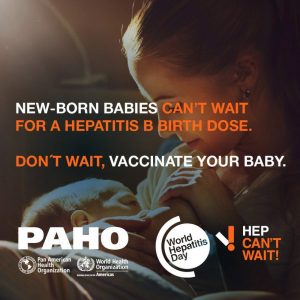- Submit News
- 501-666-6726
- [email protected]

Qatar-US, Mexico-Canada face off in Concacaf Gold Cup semifinals on Thursday
July 28, 2021
Belize Defense Force mourns death of Staff Sergeant who died in traffic accident
July 28, 2021Posted: Wednesday, July 28, 2021. 4:24 pm CST.
By Rubén Morales Iglesias: As we observe World Hepatitis Day, the Pan American Health Organization (PAHO) is concerned that the COVID-19 pandemic has disrupted health services and affected the control of hepatitis, but believes that the goal of eliminating hepatitis in the Americas by 2030 is still possible.
“Elimination of viral hepatitis B and C infections by 2030 is an achievable goal for improving health and well-being throughout the Americas,” said Pan American Health Organization (PAHO) Director Carissa F. Etienne. “But the pandemic has slowed our progress. We must redouble our efforts to keep hepatitis elimination on track. People living with viral hepatitis can’t wait.”
PAHO said that a recent joint PAHO/WHO survey showed that the COVID-19 pandemic has affected the by “disrupted diagnosis and treatment of viral hepatitis B and C infections in Latin America and the Caribbean, slowing progress on the goal of eliminating these infectious diseases by 2030”.
PAHO said the survey was done before July 28 World Hepatitis Day which “is celebrated annually to raise awareness about viral hepatitis, a group of infectious diseases that cause inflammation of the liver and can lead to cirrhosis and liver cancer”.
According to PAHO, 5.4 mllion people in the Americas had hepatitis B infections, while 4.8 million have been infecte with hepatitis C. PAHO/WHO’s objective is to eliminate hepatitis B and C by 2030. The theme of the PAHO/WHO campaign to do away with hepatitis is “hepatitis can’t wait”.
“Elimination of viral hepatitis B and C infections by 2030 is an achievable goal for improving health and well-being throughout the Americas,” said Dr. Etienne. “But the pandemic has slowed our progress. We must redouble our efforts to keep hepatitis elimination on track. People living with viral hepatitis can’t wait.”
The PAHO/WHO survey said that more than half of the 18 Latin American and Caribbean countries that participated in the survey reported some level of disruption in the diagnosis and treatment of hepatitis B and C. Seventeen percent of the countries said that there have been severe interruptions affecting new diagnoses and treatment.
As a result, PAHO/WHO have asked member countries “to sustain hepatitis testing, prevention, vaccination, and treatment services while integrating them into primary health care. PAHO/WHO also recommends that all newborns are vaccinated against hepatitis B and receive at least two additional vaccine doses within a year of birth to be protected for life”.
According to WHO, each year there are about 67,000 new infections with viral hepatitis C in the Americas with 84,000 deaths. Antivirals can cure more than 95% of those infected with hepatitis C. The problem is that only 22% of people who are chronically infected are diagnosed. Only 18% of them have received treatment.
As to hepatitis B, every year there are 10,000 new viral hepatitis B infections but 23,000 people die throughout the Americas and the Caribbean. As in the case of hepatitits C only a small percentage, 18% to be exact, is diagnosed and only about 3% of them are receiving treatment.
“Hepatitis is a serious but highly treatable disease,” said Dr. Etienne said. “However, we are a long way from ensuring that everyone who has hepatitis is getting the services that could mean recovery for them. We cannot afford to neglect hepatitis.”
“Vaccination has enabled the elimination of early childhood transmission of hepatitis B in the Americas, but childhood vaccination rates have also decreased, threatening that achievement,” she noted. “We cannot let our progress be eroded.”
PAHO said that through its Strategic Fund, the organization has assisted a number of countries in getting medicines which can cure hepatitis C in three months. But, PAHO said, many countries aren’t increasing the treatment because prices are still to high for many people.
Hepatitis is only one of 30 diseases that is intending to put a stop to through its Elimination Initiative launched in 2019.
Advertise with the mоѕt vіѕіtеd nеwѕ ѕіtе іn Belize ~ We offer fully customizable and flexible digital marketing packages. Your content is delivered instantly to thousands of users in Belize and abroad! Contact us at mаrkеtіng@brеаkіngbеlіzеnеwѕ.соm or call us at 501-612-0315.
© 2021, BreakingBelizeNews.com. Content is copyrighted and requires written permission for reprinting in online or print media. Theft of content without permission/payment is punishable by law.




































































Comments